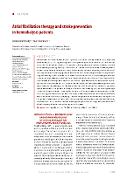Atrial fibrillation therapy and stroke prevention in hemodialysis patients

Publication date
2023Published in
Kardiologia PolskaVolume / Issue
81 (12)ISBN / ISSN
ISSN: 0022-9032Metadata
Show full item recordCollections
Abstract
The prevalence of atrial fibrillation (AF) in patients with chronic kidney disease (CKD), especially on hemodialysis (HD) is higher compared to the general population without CKD and reaches ~20%. The risk of ischemic stroke in CKD patients is also significantly increased. However, since the risk of bleeding is also significantly increased in CKD patients and the number of bleeding events exceeds the number of thrombotic events, there are great concerns regarding the routine use of anticoagulation in this patient population. No randomized studies were performed to compare anticoagulation with placebo in patients with advanced CKD and AF. This lack of knowledge is reflected in international guidelines which refrain from clear recommendations. The use of anticoagulation for stroke prevention in HD patients with AF should be strictly individualized for each patient. Anticoagulation for stroke prevention in HD patients with AF seems justified only in selected patients with high stroke and low bleeding risk. Reduced-dose direct oral anticoagulants (especially apixaban) may prove beneficial. In patients with high thrombotic and bleeding risk, left atrial appendage closure could be considered. In this article, the results of the most relevant observational studies with anticoagulation in CKD/HD patients with AF have been presented and discussed. Furthermore, results of randomized studies comparing vitamin K antagonists with non-vitamin K antagonists in CKD patients have been discussed in detail. Finally, ongoing randomized studies with reduced doses of apixaban, factor XI inhibitors, and left atrial appendage closure in CKD patients are mentioned. A brief summary of rhythm control strategies in AF is given.
Keywords
anticoagulation, atrial fibrillation, bleeding, dialysis, renal failure
Permanent link
https://hdl.handle.net/20.500.14178/2192License
Full text of this result is licensed under: Creative Commons Uveďte původ-Neužívejte dílo komerčně-Nezpracovávejte 4.0 International






